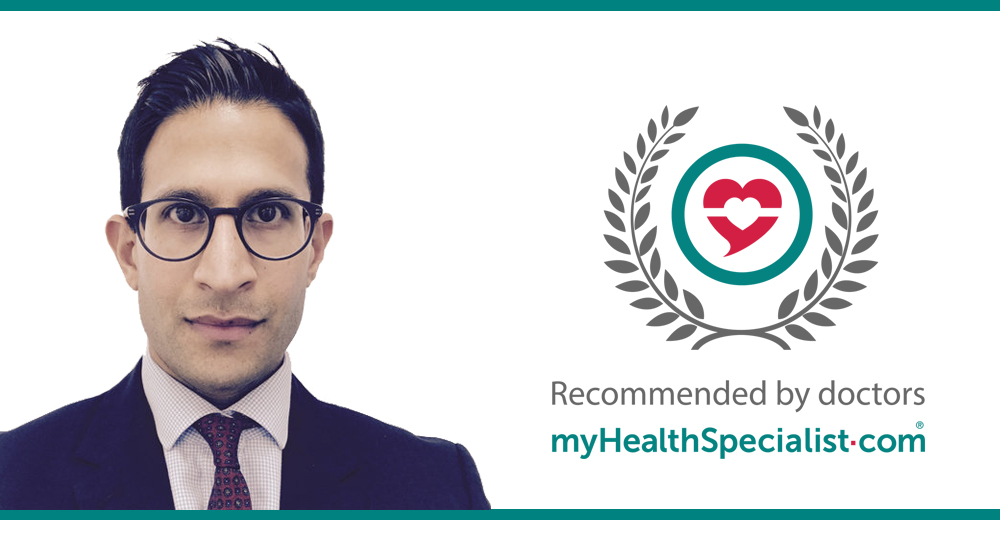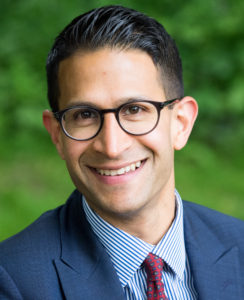
Why did you choose your particular specialty?
Because it was clear to me early on that I will only ever get more and more interested in this incredible specialty. When I undertook my medical degree, neuroanatomy intrigued me and led me to undertake a BSc in Neuroscience between my pre-clinical and clinical studies. During this, I undertook a fantastic project with Dr Jonathan Gale, patch-clamping vestibular cells and discovering their electrical properties. Having undertaken a Senior House Officer role at The National Hospital for Neurology and Neurosurgery I was drawn by the highly clinical method for teasing apart a large array of complex diseases. Despite the sophisticated tests we have, we can gain so much information about pathology in a complex system by just talking with and examining the patient in clinic.
What do you enjoy most about your job?
Neurology has a myth of being a specialty that only provides a diagnosis and lacks treatment options. I very much enjoy debunking this where possible. We are coming across more and more treatable diseases. Whilst it is true that we deal with some conditions that we cannot cure, we can nearly always provide a very helpful service for our patients in the form of accurate diagnosis, prognosis, therapy where required and symptom control. It is difficult not to be excited every day at work by the fascinating array of conditions that one diagnoses. Neurology remains a very engaging and endlessly stimulating specialty that requires detective work and a careful eye and ear to make accurate diagnoses.
What one thing do you wish every member of the public knew?
What physicians do and how surgery is only a small part of ‘Medicine’!
What three traits define you?
Approachable, enthusiastic, dedicated.
Who is your inspiration?
My teachers throughout my life, from some of the most inspiring at school and university, to those, particularly at The National Hospital for Neurology and the Royal Free Hospital London, who taught me Neurology. As a medical student, Professor Andrew Lees’ account of the Brown-Sequard syndrome got me hooked! Ultimately however, I cannot be more inspired by my children and their unique ability to ask questions that puts the Socratic method to shame.
What accomplishment in your life are you most proud of?
Apart from my career and family life and endlessly juggling the two, my most proud accomplishment must be safely descending with a parachute from 10,000 ft in the air, having erroneously pulled my rip cord whilst skydiving.
If you could do another job for just one day, what would it be?
Tricky. Perhaps Bob Dylan’s chauffeur. Failing that, perhaps a mathematician for a day.
What advances in medicine are you most excited about?
I am most excited by pharmacogenomics and being able to accurately predict the response to treatment and identify the personalized risk of side effects of medications based on the genetic profile of our patients.
What (health) app would you most recommend?
During my PhD I designed and produce an app for diagnosing tremor disorders. However, my favourite must be my fitbit app, which I would recommend to anyone to help them focus on preventing illness.
What charities do you admire/support?
I admire many charities. I happen to currently support the National Deaf Children’s Society and Plan International, which supports children in need. I support and admire the work of Parkinson’s UK which is such an incredible source of information and support for patients who I treat with Parkinson’s disease.
This article is for information only and should not be used for the diagnosis or treatment of medical conditions. myHealthSpecialist makes no representations as to the accuracy or completeness of any of the information in this article, or found by following any link from this article. Please consult a doctor or other healthcare professional for medical advice.

Dr Tabish Saifee, Consultant Neurologist
Book an appointment with Dr Tabish Saifee
Read Dr Tabish Saifee’s latest article: Parkinson’s disease – myths, reality and recommendations